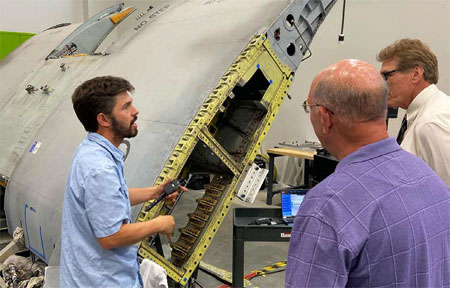Brice Wallace
A new center at the Falcon Hill Aerospace Research Park is being hailed as a hub for university students and faculty to work with government and the private sector to advance Northern Utah’s aerospace and defense industries.
Weber State University recently opened the Miller Advanced Research and Solutions Center near Hill Air Force Base, funded through a $3.5 million donation from the Larry H. & Gail Miller Family Foundation.{mprestriction ids="1,3"} The MARS Center aims to create opportunities for WSU students and faculty to research and apply innovative solutions to real-world problems in the realm of national defense.
“This is a major boom to the Northern Utah ecosystem,” Craig Rees, director of digital campaign at Air Force Materiel Command, said during opening ceremonies. “It creates — as we think about the hundreds of thousands of airmen and airwomen that are out serving our country and need the latest and the greatest innovation — the ability to bring them from outside the base, to bring academia, to bring industry, to bring small businesses together, to innovate and start getting after large systemic challenges that we face as a country.”
Several speakers noted the benefits for both the students getting the skills needed for careers in advanced manufacturing in the aerospace and defense fields and for industry getting a trained workforce.
“The MARS Center will allow students to study and help solve real-world problems, critical to our economic vitality and our national defense, all while building their skill sets and boosting their employability,” said David Ferro, dean of engineering, applied science and technology at Weber State University. “More than a gift, the Miller family has truly invested in future generations.”
Thomas Lockhart, director of engineering and technical management at the Air Force Nuclear Weapons Center, said the MARS Center will be crucial to the development of materials, energies and extreme environments.
“In order for us to be successful, we’ve got to be able to understand that material and we’ve got to actually produce it,” Lockhart said. “And so that’s very important for the nation. … It is important for the Department of Defense and for our nation and national security.”
Kristen Baldwin, deputy assistant secretary of the Air Force for science, technology and engineering, said the center will help the U.S. maintain a competitive advantage “over our peer foreign nations who seek to achieve global dominance over the United States of America.”
“My hashtag is ‘technology, tools and talent,’” she said. “And that is what facilities like the MARS Center is going to bring to bear in this ecosystem that you have here. … And what you have helped to build is [to] bring our ecosystem together to build that national security and that national economic impact, because that is the way that we maintain our technological advantage over our peer competitors, to do the mission that we have to carry out as the Department of Defense and to make our nation stronger and safer.”
State Senate President Stuart Adams described the center as “one-stop shopping” to bring employers, education, industry and government together.
“As I think about education and the cost of education, think about going through the entire educational process and not having a job. Pretty depressing. Think about being an employer and having lots of jobs but nobody to work. This facility brings those two entities, employers and the academics, together.”
Moreover, he said, “we’re actually protecting our national security. And that is beyond anything that I think we can do in the state, or we can do economically, or we can do as far as a quality of life.”
Steve Starks, CEO of the Larry H. Miller Co., described the MARS Center as “an incredible collaboration.”
“This is, in my mind, what the future will look like as academia and industry become more aligned and work together, focused on outcomes,” Starks said, noting that such collaboration creates jobs, advances products and services, and creates efficiencies.
It also addresses “significant needs for our economy,” he said. “And it’s creating incredible economic value. It’s blessing people’s lives, and it’s also helping us become safer as a nation.”
Gail Miller, owner of the Larry H. Miller Co. and chair of the Larry H. & Gail Miller Family Foundation, said the foundation was drawn to the goal of providing opportunity for students to gain innovative skills and build successful careers in advanced manufacturing. That will help support the aerospace and defense industries but also allow them to launch startup businesses into the market, she said.
“I think it’s important too, that as we establish this research and solution center, Weber State University will play an important role in protecting the nation’s freedoms. They will create a better future for generations to come, and they will inspire students to solve real-world problems. Each student’s hands-on learning … the experience they’ll have in this building, will prepare them to lead and make a difference in areas where we’re seeing a growing demand for high-skilled workers.”
Weber State University President Brad Mortensen likened the center’s opening to the completion of the Transcontinental Railroad.
“I can’t think of things like today without making the comparison of how 153 years ago, 60 miles or so northwest of here, there was a huge transformation in our country, in our world, when the Golden Spike was driven,” he said.
“And now Northern Utah is at this crossroads again where there is this tremendous activity happening that will transform our country, transform our world, in providing for our national defense. It’s happening here in Northern Utah and we at Weber State get to be and want to be a central part of that.”{/mprestriction}








